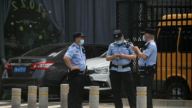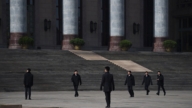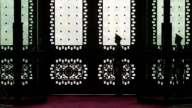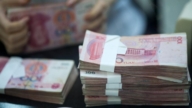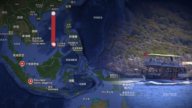【新唐人2013年09月21日讯】“9.18事变”82周年之际,中、日在钓鱼岛继续尖锐对立,随时有擦枪走火之势;但在中国大陆的“9.18”周年纪念日却异常平静,平静得让日本人都感到意外。为什么国内、国外的局势会表现出两重天呢?请看报导。
9月10号是日本对钓鱼岛实施“国有化”整整一年的日子。当天,中共派出7艘海警船驶入钓鱼岛8海里的领海内巡查,日本海上保安厅则派出7艘执法船展开监视和阻拦,中、日展开“一对一”巡海护权行动﹔中方4艘海警船11号再次进入钓鱼岛海域巡查,与日方4艘海保船又短兵相接。
据大陆媒体消息指称,中共海警船1年来巡航钓鱼岛59次,最近距岛0.28海里,多次与日船近距离对峙。
北京时政观察人士华颇:“前两天日本媒体报导,发现中国的无人机进入钓鱼岛上空,并威胁要击落它。中国(共)外交部发言人也对此回应说我们有决心、有能力维护钓鱼岛的主权。这时,美军太平洋司令也发表了一个讲话,说有可能派‘鱼鹰’运输机进入钓鱼岛。”
北京时政观察人士华颇认为,中日关系正在向不可预知的方向发展,如果双方行为不收敛,冲突不可避免。
华颇表示,最近中共审讯薄熙来,打击、整肃网路都引发民众对中共的不满,所以需要转移人们的视线,需要用民族主义精神来重新凝聚人心。钓鱼岛危机就能达到这一目地。
不过,在“9.18事变”82周年的纪念日,除了当年的事发地—-辽宁沈阳在上午9点18分,全市鸣响防空警报三分钟外,只有吉林长春、河南郑州等地鸣响防空警报。在中国网络上,也没有任何关于“呼吁进行游行”的消息。
日本的《每日新闻》报导说:在迎来“9.18事变”82周年的18号,大陆地方媒体虽然发表了相关评论,但是包括北京的日本驻中国大使馆在内的日本驻在单位、企业等,都没有遇到显着的抗议活动。
日本第11管区海上保安总部18号也透露,中共公务船从4号起已连续14天进入毗连区,但两艘中国海警船已于17号晚间10点50分左右先后驶离该水域。
“9.18事变”是指1931年9月18号,日本军队以中国军队炸毁日本修筑的南满铁路为借口而占领沈阳。事变爆发后,日本与中国之间矛盾激化,日本开始全面侵华。短短几年时间内,东北三省全部被日本关东军占领。
9月18号被中国人视为国耻日。
在去年,沈阳、北京、上海、广州、西安等150个城市发生了反日游行,多地发生了“打砸抢”事件,无数日系汽车被砸。
今年的9.18中国却如此的平静,连日本媒体都感到意外。《法国国际广播电台》引述日本媒体的消息说:“中国好像忘了反日骚动”。
时政评论家伍凡认为,目前国内外的政治经济形势,逼迫习近平缓和与日本的关系。
美国中文媒体《中国事务》总编辑伍凡:“从这个举动来看,他不想跟日本关系搞得更僵,搞得更坏,现在已经有一个钓鱼岛了;第二个原因,中国和日本经济贸易交往,已经大幅度下滑,已经快没有生意做了;第三点,日本从中国的资本都撤出来,撤到东南亚去了。”
日本《中文导报》近日报导,2013年上半年中日两国贸易规模为1472亿美元,同比减少了10.8%。
伍凡还指出,中国国内局势非常敏感,各地维权抗暴此起彼伏,中共都不敢利用“大规模群众运动”,来达到政治目地伎俩了。
伍凡:“现在东北三省维权抗暴很厉害,他们绝对不会看好中共。如果再加上一个大家上街抗议日本人,是不是这种维稳抗议会转向,转向抗议中共,所以它也害怕。”
《法广》也指出,中共当局今年格外小心,为了达到维稳的目地,采取了禁止、阻碍民间任何反日集会活动的措施。
采访/朱智善 编辑/宋风 后制/李智远
China Japan Standoff Over Diaoyu Islands.
9.18 Anniversary Protests Absent
On the 82nd anniversary of 9.18 Incident, China and
Japan are in a stand off over the Diaoyu Islands.
The 9.18 incident refers to an event that
initiated Japans invasion of Manchuria in 1931.
A military confrontation over Diaoyu
could happen at any moment.
However, mainland China is unusually quiet
on 9.18, which even surprised the Japanese.
Why is the situation inside and outside of China so different?
September 10 marked a year since
Japan nationalized the Diaoyu Islands.
The CCP dispatched seven coast guard boats into territorial
waters, within 8 nauitcal miles of the Diaoyu Islands.
The Japanese coast guard dispatched 7 enforcement
vessels to monitor and block the Chinese boats.
China and Japan had faced a direct confrontation.
4 Chinese coast guard boats went into the territorial waters
of the Diaoyu Islands again on September 11, for inspection.
4 Japanese boats were again sent to stop them.
According to mainland Chinese media, the CCP
coast guard boats have gone to Diaoyu Island
territorial water 59 times in one year.
At one point, the boats were 0.28
nautical miles from the Diaoyu Islands.
Chinese and Japanese boats have
had close standoffs many times.
Hua Po, political expert, Beijing:"Japanese
media recently reported that a Chinese UAV
went into the Diaoyu Islands airspace.
Japan wanted to shoot it down.
The CCP’s foreign ministry spokesman responded
that China has the confidence and power to
safeguard the sovereignty of the Diaoyu Islands.
Meanwhile, a U.S. Pacific commander gave a speech.
It was stated that the US may send the
Osprey aircraft to the Diaoyu Islands."
Hua Po believes China-Japan relations are unpredictable.
If both sides are reluctant to back down, conflict is inevitable.
Hua Po indicates that Chinese people are unsatisfied with
the Bo Xilai trial and recent crackdowns on internet speech.
The CCP will be using the spirit of
nationalism to distract people’s attention.
The Diaoyu Islands dispute is a good topic to achieve this.
On 9.18 this year, only three locations rang air
raid sirens at 9:18 am to mark the anniversary.
This was in Shenyang, Liaoning Province, where
the incident happened, as well as Changchun,
Jilin Province, and Zhengzhou, Henan Province.
There were no calls for protest sent out over the internet.
Japanese media The Mainichi released a report.
On the 82nd anniversary of 9.18, although mainland local
media published commentaries, no Japanese institutions
or companies in Beijing suffered any protest activities.
Japanese No.11 District Coast Guard Headquarter
stated on September 18 that Chinese ships have
continually entered border waters since September 4.
The two Chinese coast guard boats left these
waters at around 10:50 pm on September 17.
9.18 incident happened on Sept 18, 1931.
The Japanese military seized Shenyang,
after a small explosion on the Nanman railway
was blamed on the Chinese dissidents.
After the incident, Japan and China conflict intensified,
and Japan began a full-scale invasion of China.
The Japanese military occupied 3
northeastern Provinces in a few years.
The Chinese people see 9.18 as a day of humiliation.
Last year, anti-Japanese protests took place in 150 cities
including Shenyang, Beijing, Shanghai, Guangzhou, Xian.
People smashed Japanese cars
and restaurants in many cities.
This year’s 9.18 was very peaceful,
leaving Japanese media surprised.
Radio France International quoted from Japanese media.
It said,"it seems like China forgot anti-Japanese activities."
Political commentator Wu Fan indicates that the current
domestic and international political and economic situation
has forced Xi Jinping to alleviate China-Japan relations.
Wu Fan, Chief Editor, China Affairs:"From
this action, he (Xi Jinping) doesn’t want
to intensify the relationship with Japan.
There’s already the Diaoyu Islands dispute.
Secondly, trading between China
and Japan has declined substantially.
There’s almost no business between the two.
Japan has withdrawn its capital from China
and moved the investment to Southeast Asia."
Japanese media Chubun recently reported that during the
first half year of 2013, trade between China and Japan
was $147.2 Billion, representing a decrease of 10.8%.
Wu Fan also suggests that China’s
domestic situation is very sensitive.
Rights activities are everywhere, and the CCP doesn’t
dare to use “mass movements" to achieve political goals.
Wu Fan:"Rights protection in three
northeastern provinces are very severe now.
People are definitely not very optimistic towards the CCP.
If people also protest against Japan on the streets, it’s
hard to tell if the protest may also turn against the CCP.
Thus, the CCP is afraid of that."
RFI also pointed out that the CCP is very careful this year.
It took measures to ban and stop civil anti-Japanese
activities, in order to maintain social stability.




